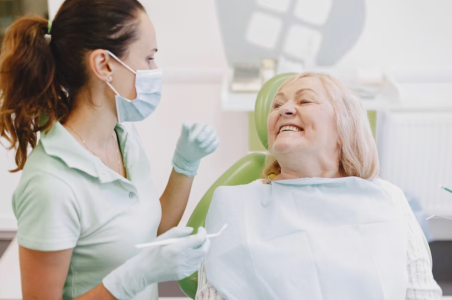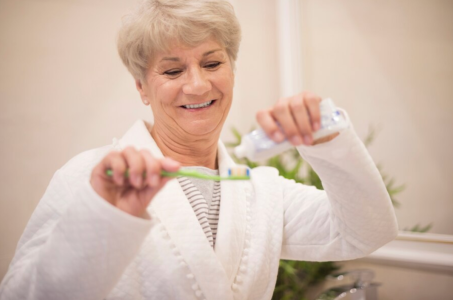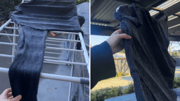Are you unknowingly damaging your teeth? A dentist reveals the four frequent brushing mistakes you're probably making!
By
VanessaC
- Replies 4
Good dental health goes way beyond brushing your teeth twice a day and not eating too much sugar.
In reality, there are so many factors that can potentially damage your teeth and gums, and if you're not aware of them, it could lead to serious issues in the future.
Dentists have come to our aid and shared their top tips and tricks that would help keep our pearly whites in tip-top condition.
1: Using mouthwash after brushing
Many of us are probably in the habit of rinsing our mouths with water or mouthwash after brushing our teeth.
However, Dr Praveen Sharma, a Birmingham-based Specialist in Restorative Dentistry and Scientific Adviser to the British Dental Association, said that rinsing your mouth out with mouthwash after brushing your teeth can actually remove the fluoride residue from your toothpaste, which is what helps protect your teeth from harmful bacteria and reduces your risk of cavities by 25 per cent.
Instead, your best bet is to simply spit after brushing and using mouthwash at a different time.
'After brushing, spit don't rinse, or you'll dilute the benefit of fluoride,' Dr Sharma advised.
'If you use mouthwash, the same principle applies, make sure to use [them] at different [times]...'
2: Not allowing enough time between eating and brushing
For sparkly smiles and good dental hygiene, experts suggest waiting at least 60 minutes before cleaning your teeth after meals.
This is because the enamel on your teeth needs time to remineralise naturally, especially after eating or drinking something acidic (like a soft drink).
Dr Sharma said: 'Ideally, leave a gap of between 30-60 minutes after eating or drinking before brushing your teeth because the mouth needs a little time to clean itself and let the surfaces of the teeth reset.'
'You might think that ''diet'' soft drinks, fruit juices and smoothies are safe alternatives, but they aren't. There's an acid component to many of them which attacks the surface of your teeth, raising the risk of erosion—wearing away the surface of the teeth—and tooth decay.'
Tooth decay is a result of a sticky layer of bacteria buildup called plaque, which damages the surface of the teeth over time.
3: Not using interdental brushes
If you're not already using interdental brushes, then you're probably putting your teeth and gums at risk.
These small tools can help get into the gaps of your teeth where pieces of food and plaque can build up, causing gum disease if not removed.
'Aim to clean the spaces in between your teeth (where there is space) with interdental brushes at least once a day,' suggested Dr Sharma.
'It is advisable to do this before brushing. If the spaces between the teeth are too tight to insert a brush, use floss.'
'When brushing, aim the bristles of the brush down towards the gum for the bottom teeth and up towards the gum for the top teeth at 45 degrees.
'This allows the bristles to go slightly below the gum line.'
Dr Sharma recommends brushing in small circular motions and avoiding a 'scrubbing motion' which can damage one’s teeth and gums.
4: Not brushing your teeth before bed
Not brushing your teeth at night allows bacteria to feast on sugars from food and mouth acids in the absence of saliva defences, which is lower when one is asleep.
'Saliva helps to wash away the bacteria that cause tooth decay,' Dr Sharma explained.
'Brush teeth twice daily with a fluoride toothpaste for at least two minutes to thoroughly clean all the surfaces of your teeth, especially before going to bed when saliva production is at its lowest.'
Another area of dental health that often gets overlooked is the care of dentures.
Like natural teeth, dentures also require daily cleaning. Not only will this keep them sparkling, just like your original set, but it can also enhance their lifespan.
It is recommended to run a soft-bristle toothbrush over your dentures at least twice a day.
Moreover, instead of common toothpaste, use a mild dishwashing liquid or denture cleaning solution, because many toothpastes are abrasive and might cause small damages over time.
In addition, wearing your dentures continuously without giving them a break can lead to discomfort and other oral issues.
So, remember to soak your dentures in water or a denture-cleaning solution overnight. This helps to keep them moist and retain their shape.
Ensuring proper care of your dentures is crucial for overall oral health and can help you to avoid unnecessary discomfort or denture repairs. So, just as with regular teeth, don’t neglect your faux pearly whites. They deserve some love too!
 Are there any other tips you have to keep your teeth and gums healthy? Let us know in the comments below!
Are there any other tips you have to keep your teeth and gums healthy? Let us know in the comments below!
And don’t forget to share this article with your family and friends to help keep their pearly whites in tip-top condition!
In reality, there are so many factors that can potentially damage your teeth and gums, and if you're not aware of them, it could lead to serious issues in the future.
Dentists have come to our aid and shared their top tips and tricks that would help keep our pearly whites in tip-top condition.
1: Using mouthwash after brushing
Many of us are probably in the habit of rinsing our mouths with water or mouthwash after brushing our teeth.
However, Dr Praveen Sharma, a Birmingham-based Specialist in Restorative Dentistry and Scientific Adviser to the British Dental Association, said that rinsing your mouth out with mouthwash after brushing your teeth can actually remove the fluoride residue from your toothpaste, which is what helps protect your teeth from harmful bacteria and reduces your risk of cavities by 25 per cent.
Instead, your best bet is to simply spit after brushing and using mouthwash at a different time.
'After brushing, spit don't rinse, or you'll dilute the benefit of fluoride,' Dr Sharma advised.
'If you use mouthwash, the same principle applies, make sure to use [them] at different [times]...'
2: Not allowing enough time between eating and brushing
For sparkly smiles and good dental hygiene, experts suggest waiting at least 60 minutes before cleaning your teeth after meals.
This is because the enamel on your teeth needs time to remineralise naturally, especially after eating or drinking something acidic (like a soft drink).
Dr Sharma said: 'Ideally, leave a gap of between 30-60 minutes after eating or drinking before brushing your teeth because the mouth needs a little time to clean itself and let the surfaces of the teeth reset.'
'You might think that ''diet'' soft drinks, fruit juices and smoothies are safe alternatives, but they aren't. There's an acid component to many of them which attacks the surface of your teeth, raising the risk of erosion—wearing away the surface of the teeth—and tooth decay.'
Tooth decay is a result of a sticky layer of bacteria buildup called plaque, which damages the surface of the teeth over time.
3: Not using interdental brushes
If you're not already using interdental brushes, then you're probably putting your teeth and gums at risk.
These small tools can help get into the gaps of your teeth where pieces of food and plaque can build up, causing gum disease if not removed.
'Aim to clean the spaces in between your teeth (where there is space) with interdental brushes at least once a day,' suggested Dr Sharma.
'It is advisable to do this before brushing. If the spaces between the teeth are too tight to insert a brush, use floss.'
'When brushing, aim the bristles of the brush down towards the gum for the bottom teeth and up towards the gum for the top teeth at 45 degrees.
'This allows the bristles to go slightly below the gum line.'
Dr Sharma recommends brushing in small circular motions and avoiding a 'scrubbing motion' which can damage one’s teeth and gums.
4: Not brushing your teeth before bed
Not brushing your teeth at night allows bacteria to feast on sugars from food and mouth acids in the absence of saliva defences, which is lower when one is asleep.
'Saliva helps to wash away the bacteria that cause tooth decay,' Dr Sharma explained.
'Brush teeth twice daily with a fluoride toothpaste for at least two minutes to thoroughly clean all the surfaces of your teeth, especially before going to bed when saliva production is at its lowest.'
Another area of dental health that often gets overlooked is the care of dentures.
Like natural teeth, dentures also require daily cleaning. Not only will this keep them sparkling, just like your original set, but it can also enhance their lifespan.
It is recommended to run a soft-bristle toothbrush over your dentures at least twice a day.
Moreover, instead of common toothpaste, use a mild dishwashing liquid or denture cleaning solution, because many toothpastes are abrasive and might cause small damages over time.
In addition, wearing your dentures continuously without giving them a break can lead to discomfort and other oral issues.
So, remember to soak your dentures in water or a denture-cleaning solution overnight. This helps to keep them moist and retain their shape.
Ensuring proper care of your dentures is crucial for overall oral health and can help you to avoid unnecessary discomfort or denture repairs. So, just as with regular teeth, don’t neglect your faux pearly whites. They deserve some love too!
Key Takeaways
- Dentists recommend waiting up to 60 minutes after eating before brushing your teeth to prevent enamel damage.
- Using mouthwash or rinsing immediately after brushing can remove beneficial fluoride residue from your teeth.
- It is advised to clean between your teeth using interdental brushes or floss at least once a day, ideally before brushing.
- Not brushing before bed can allow bacteria to damage your teeth as saliva production, which helps wash away bacteria, is at its lowest during sleep.
And don’t forget to share this article with your family and friends to help keep their pearly whites in tip-top condition!









